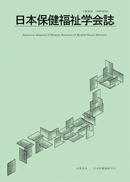All issues

Volume 20 (2013)
- Issue 2 Pages 3-
- Issue 1 Pages 1-
Volume 20, Issue 1
Displaying 1-4 of 4 articles from this issue
- |<
- <
- 1
- >
- >|
-
[in Japanese], [in Japanese], [in Japanese]Article type: Article
2013Volume 20Issue 1 Pages 1-7
Published: October 31, 2013
Released on J-STAGE: September 15, 2017
JOURNAL FREE ACCESSDownload PDF (878K) -
Misako Matsumoto, Ryoji Shinohara, Taeko Watanabe, Emiko Tanaka, Etsuk ...Article type: Article
2013Volume 20Issue 1 Pages 9-20
Published: October 31, 2013
Released on J-STAGE: September 15, 2017
JOURNAL FREE ACCESSObjective: This study attempts to clarify ways by which childcare professionals can promote social competence in children. Method: Focus group interviews were conducted with nineteen child care professionals (three groups) working in a nursery center that had conducted competence-development programs for not only typically developing children but also children with developmental disabilities. Results: Care professionals were found to play seven roles: objective clarification, helping enjoy, interpersonal relationships, expanding social network, changing the rhythm, promoting flexibility and adjustment when participating in group activities, keeping the future in perspective, and evaluating the effects of measures to promote social competence. Through analysis of interview data, we extracted fifteen categories: clarification of childcare policy, inculcating self-efficacy in the children, improving communication skills, readiness to face challenges, relationship with children, recognizing each child's individuality, cooperation between staff members, cooperation with parents, new community, organizing events, changing the status quo, a curriculum that matched children's development, expansion of activity, sending out signals, and understanding parents' perspectives. Conclusion: The findings, which reflect the actual voices of childcare professionals, are expected to aid in the realization of community empowerment.View full abstractDownload PDF (1325K) -
Yukiko Kajiwara, Naoki Harada, Meguru Minami, Makoto Masumitsu, Kencho ...Article type: Article
2013Volume 20Issue 1 Pages 21-34
Published: October 31, 2013
Released on J-STAGE: September 15, 2017
JOURNAL FREE ACCESS(Objectives) This study was to clarify present situation of "designated medical care for students" provided by teachers of Japanese special education schools, and their expectations and anxieties about providing "designated medical care" in the setting of special education schools. (Methods) We originally developed a questionnaire for present situation of providing "designated medical care", teacher-training for learning skills of "designated medical care", and expectations and anxieties among teachers. The questionnaire was delivered to principals of all Japanese special education schools (1,110 schools). We employed text analysis (SPSS) and correspondence analysis (SPSS) for open-ended questions regarding expectations and anxieties. (Results) A total of 333 schools had students who needed "designated medical care" in school settings. Of 333 schools, 283 schools (85.0%) provided "designated medical care" in schools. Of 283 schools, nurses provided "designated medical care" in 255 schools (90.1%). Teachers provided it in 121 schools (42.8%) and parents did it in 86 schools (30.4%). Of 283 schools, teachers did not provide the care in 152 schools, among which 117 schools (41.3%) had some plans for providing it by teachers. Of 333 schools, 50 schools did not provide the care, among which two schools (4%) had some plans for providing it by teachers. Of 333 schools, 116 schools (34.8%) had some plan for training teachers for learning skills of the care. A correspondence analysis showed that major factors of expectations of teachers' providing the care were "promotion of educational activities" and "relief of parents' burden". The analysis also revealed that two keywords such as "incidents" and "risk of accidents" constituted a separated category for factors of anxieties of teachers' providing the care. (Conclusion) Further researches are needed for clarifying incidents and risk of accidents relating "designated medical care" in the setting of special education schools.View full abstractDownload PDF (1321K) -
Miyuki Saito, Eiko Suzuki, Tomomi AzumaArticle type: Article
2013Volume 20Issue 1 Pages 35-45
Published: October 31, 2013
Released on J-STAGE: September 15, 2017
JOURNAL FREE ACCESSPurpose: To clarify the life functions of psychiatric day-care center attendees based on the functioning assessment scale for mentally disabled individuals. Methods: Using a recorded questionnaire, a survey was conducted on 207 psychiatric day-care center attendees between September and November, 2006. The functioning assessment scale for mentally disabled individuals was prepared based on the International Classification of Functioning, Disability and Health (ICF). This consists of activity (personal accomplishment of tasks) and participatory (interactions in life and life situations) aspects. Results: Subjects included 143 participants (69.1%) who answered all question fields. The subjects were 48.1 ± 13.2 (mean ± SD) years old and had been attendees for 61.9 ± 47.5 (mean ± SD) months. The subjects scored 89.4 ± 21.1 (mean ± SD) for life function points. Differences in functioning were observed according to the purpose of receiving care, such as improvement of quality of life, and expansion of activities of daily living. There was a significant difference in the life function points between the subjects living with their grandmothers and those not. Using day care to improvement of quality of life and to get a job or enter a school were significant prescriptive factors. Conclusion: Psychiatric day-care center attendees were maintaining regular life functions while receiving psychiatric day care support.View full abstractDownload PDF (1078K)
- |<
- <
- 1
- >
- >|